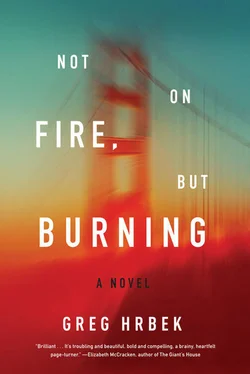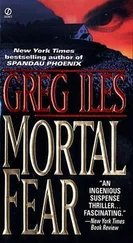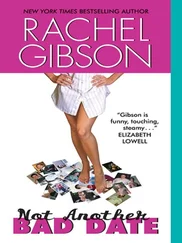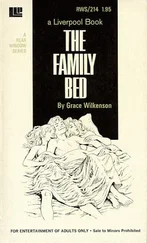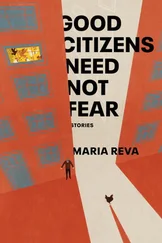“So, he’s dead,” Karim said. “He’s a shahid.”
Yassim nodded.
In a tone falling somewhere between reverence and incredulity, Karim said: “He really did it.”
“Just like we will.”
“We?”
“It’s a joint operation now,” Yassim said, as a child skinned her knee and broke into tears. “That’s why I’m here.”

The Algonquin: A very big and very old building on Broadway. A four-storied castle of red brick with arches and columns and balconies, made during that gilded age when the town had lured people with its healing waters and horses. Once a hotel, now rental apartments. As he locks his bike to an iron rack near the entrance, Dorian realizes that he never has looked at the building closely. There seems to be something false about its grandeur. He walks up to the door. No video intercom, just a silver frame with black buttons and a speaker. No name next to 30½. He presses the button. No answer. But an interval during which he thinks: You’ve come to them, you’re asking them to let you in …
Through the speaker: “ Yeah .”
Dorian’s voice sticks in his throat.
“Hello?”
“Yes, he says. I don’t know if this is the place, but—”
The buzzer cuts him off. He hears the lock of the inner door click. Then he is in. He goes down the dimly lit hallway, past an elevator, and enters a space his mind links to an illustration from his fifth-grade history book: The theater where Abraham Lincoln was shot. What was once a lobby looks now like an empty stage. Two wide staircases sweep up to a second-floor balcony, then a third-floor balcony … Up the stairs. Every door is red with gold numbers. On the third floor, different hallways lead to the ends and corners of the building. He goes down one of them and, not finding 30½, returns to the center and tries the next one, and like a mouse in a maze turns around again. Smell of snuffed-out greens and cleaning agents, and sounds from behind closed doors of videogame warfare and doom metal. Finally, he finds it. Knocks. Door opened by a girl with stretched earlobes. He has seen her before: one of the baristas at Café Pravda. She says, “Dorian, right? God, look what they did to you.” Touching him. Laying her hands on his face, one palm against each cheek. (For a second, he thinks she might kiss him on the mouth.) “C’mon,” she says, and leads him into a room with big arched windows, uncurtained. Not a place where anyone lives. It’s set up like an office. Several desks. A printer on one of them; a scanner on another. Bare white walls. He sees a kitchen and smells coffee. Then he sees the second room, where a voice is coming from. Something about the minutes from the last meeting. Corrections, additions. Eight men at a table, each with a palmtop or a tablet, including Jon-David, from whom he gets a look of acknowledgement, at which a kind of relief moves through Dorian, the kind he feels whenever he starts anything new (a team, a camp, a club) and sees among the new faces someone with whom he shares a background of friendship.
“Who’s this.”
“Poospatuck Incident,” Jon-David says. “It’s on the agenda.” (Turning to Dorian.) “Here, I saved you a seat.”
“What’s your name?”
“Dorian.”
As the man types it, Jon-David lays a hand on Dorian’s back and whispers: “Congratulations. You’re officially present.”
She wakes up on the couch and recalls having woken up several times already. Each time glimpsing the television, but seeing only vaguely what it was showing her, and not really hearing what was being said. On the table between herself and the television: an ashtray and the small ceramic pipe she bought in a head shop in Haight-Ashbury long ago (before the bridge fell, before Dorian) and a small plastic zip bag with a few buds of the stuff they’d had the other night in the park; all this beside a wine glass and a bottle of red, half empty. One of the times she’d awakened, she had become cognizant first of the television and then of Dorian, who was sitting on the couch beside her, looking into her eyes and touching her shoulder, prodding her gently, saying:
“Mom, Mom.”
And Kathryn had responded with something like: “Hm? What. Dorian. Are we all right?”
“Here,” he had said.
What he wanted to do was help her up. But she was alert enough to not want him to think she couldn’t do it on her own …
And so finally he had left her there, with the TV still on, thinking that’s how you end up when you don’t carefully consider every choice in life, one thing leads to another and you find yourself middle-aged and stoned and asleep in front of a neoliberal news program at nine o’clock at night. Why is she the one I want to talk to? Because, if she were sober, she’d drag it out of you. What’s the matter, she would say. Where were you tonight? She would take you by the shirt sleeve, grip your arm and make it hurt, making you believe there are things a mother is powerful enough to disallow. And my father . Won’t pressure you at all. Because deep down, he doesn’t want to know. If he stays ignorant, he won’t have to act. He can stay in his own world of stories.
Still, go looking.
You won’t find him in the room downstairs, or in the bedroom. But through a window onto the back yard, you will notice a light in the trees. Go out there, cross the lawn, and stand by the door of the gazebo. He is inside. Writing in the light of a camping lantern, by hand in a notebook. Address him through the screen.
“Dad.”
The pen will stop moving. Perhaps only coincidentally. He didn’t hear you. Just a pause in composition. But then he closes the notebook and caps the pen and turns to you and says: “Hey.”
“Hey.” (Open the door.) “What is this, like, your new office?”
“Sort of.”
The little screened-in outbuilding is furnished with a rattan couch; a small glass table, on which the lantern is set; and a lawn chair, in which you now seat yourself. Notice, on the couch, in addition to the notebook and the pen, a couple of old-fashioned books, a pod and a pair of earphones. And something else. A print-out, a picture. Grainy and ghostly, like a diagnostic medical image.
“Where were you tonight?” he asks.
“Nowhere.”
He sees what you’re looking at. His eyes go from you to the picture and back to you again. A moth is outside, trying to get in. Wings beating against the wire mesh of the window screen in a kind of code.
I knew what it was even as he gave it to me and said: “It’s the photo you wanted. I zoomed into the sunglasses. That’s the reflection.” The strange thing is, I couldn’t see it at first. Couldn’t see the thing I was consciously looking for: a girl of eight or nine, holding a camera or a phone in front of her eyes. I couldn’t see that. Still, I thought: I have not been wrong. I haven’t. He altered the image … Then suddenly the truth was obvious and clear. I saw through the illusion of the white and black pattern. The flowing lines that seemed to be the lightplay of an aurora were actually strands of long hair (there must have been a wind coming off the ocean). A sloping shape, almost whited out by a brightness that could only be the sky, became the outline of an arm and shoulder. The darker vertical line was the strap of a swimsuit top; and the dark blur making it hard to discern a face was the device that had taken the picture in which she herself had been captured.
“It’s her,” I said.
“I know it seems that way,” my father said.
“It is .”
“Dorian—”
“How did you do it? Erase everything. I search her name and there’s nothing — not even deep-archived.”
Читать дальше
